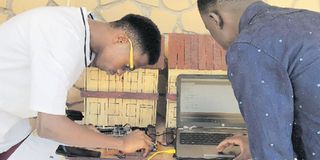It’s more than a tech festival

For Tanzania to realise its industrialisation agenda, it must put in place technology is necessary as the true engines of economic growth. Technology and innovation can drive national development, strengthen government capacities and boost regional and international networks. Many countries across the world have demonstrated that investing in science, technology and innovation can break the cycle of poverty.
So in the last weekend of June, a TechFest took place in Dar es salaam where several companies, students and even children came to demostrate to people what they had invented in the wake of recent technological trends.
Techfest is a non-profit event aiming towards inspiring creativity and innovation. It does this by sparking curiosity on how things work and what should be kept in mind when building and making something. It does this by offering trainings and coaching on the areas of science, technology and innovation.
It also encourages collaboration with like-minded people. In this particular event which took place in the country, people came together to solve problems using technology.
Among the companies present was Vodacom which had a couple of internet deals in display. Medical students from Hubert Kairuki Memorial University (HKMU), were performing a mock emergency accidental procedures, to help ‘Suzy,’ a fictional character who had just been in a car accident and had a snake bite.
Imran Y. Mussa, a 20-year-old medical doctor was demonstrating how chemical reaction of different blood groups differ from one another.
The Festival was packed with school children who had multiple inventions. An indication that the technology world has been simplified for people to try and solve specific problem.
Mohamedariff Sharif, a student and a member of Robotech Labs said, “I came to realise that in order to achieve a certain technological fit, knowledge into computer language is essential.”
Mr Mohamedariff and his team used the simplest coding language to build a walking cane that can help the blind navigate his environment without any problems with sensors and haptic feedback. They used haptic feedback because there are blind people out there who are also deaf, therefore a buzzer was not preferred.
Robotech Labs is an innovative Hub which aims at providing STEM curriculum in the field of Robotics Education.
They are a certified PTC STEM Academy as a training institute that needs practical thenextweb.com ity to drive ideas into reality.
It was founded as a need to answer the curiosity and innovative ideas that lack being brought to life, therefore aim at helping and guiding young people in driving there ideas to being applicable and implementable.
Overall, the goal was to make an impact, create the solution and make a difference in the platform of science and technology.
Their purpose is to inspire students to achieve potential and personal goals through activities that are developmentally appropriate, individually paced, and personalised to each student’s academic performance and interest.
Other than that Success also spoke to Boris Maximillian Massesa and Adam Ruben, Form Six students from IBOL Secondary School.
These young men built a device that can detect cellphones in the vicinity.
It has been designed even with an app that can be downloaded to best control the device and also alert the principle about the phone that has been used by recording its frequency.
The event was packed with people learning new information about particular occupation that otherwise was difficult to know about.
Jaffari Ndembo, a (Transfer Multisort Elektronik) TME Education Ambassador in Tanzania who has been conducting education workshops in the country since 2017.
TME is Robotech Labs’ biggest sponsor and also offer free training to young students with the passion for technology. They equip students with the potential to become great inventors.
Success also met David Tan, a product development engineer from New Zealand and Singapore who was in the country to develop different hardware for the Tanzanian market.
Mr Tan worked on a solar charging station for disaster relief back in New Zealand and he emphasised to the people of Tanzania to build more hubs to which people from different diverse backgrounds meet and learn from one another to solve different challenges in the society.




